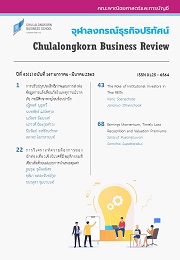Earnings Momentum, Timely Loss Recognition and Valuation Premiums
Main Article Content
Abstract
There has been debate over whether earnings momentum is due to economic fundamentals or rather manipulated business performance. This paper empirically attempts to resolve this confusion by exploiting the relations between earnings momentum and accounting conservatism. This study estimates a relation between returns and earnings momentum conditional on levels of accounting conservatism. Sample used in this study is comprised of 16,637 firm-year observations from year 1989 to year 2011. Our results show that a conservative accounting level is lower for firms that report at least one year of earnings momentum. Moreover, there is evidence consistent with under-pricing of earnings momentum that is associated with less conservative accounting in a current period but this is partially reversed in a next period. Further analysis reveals that earnings momentum determined by low accounting conservatism is directly related to higher growth and lower risk in subsequent periods. The empirical results are broadly consistent with the view that earnings momentum reported by firms is signaling stronger future performance, rather than being manipulated by managers. Collectively, this paper provides supportive evidence that earnings momentum is indicative of good firm performance rather than being a product of managerial discretion.
Article Details
Opinions and discussions in papers published by the Creative Business and Sustainability Journal (CBSJ) are deemed as personal opinions and the responsibility of the writers. They are not the opinions or responsibility of the Chulalongkorn Business School of Chulalongkorn University.
Papers, content, information etc. appearing in the Journal are deemed to be the copyright property of the Chulalongkorn Business School of Chulalongkorn University. Anybody or any organization that wishes to publish any part of them or use them in any way must obtain written permission from the Chulalongkorn Business School, Chulalongkorn University.


